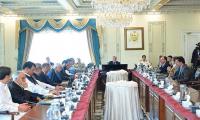LAHORE: Attracting investments in petroleum refining and petrochemicals industries is critical for the country to ease its ever-growing import bill and push exports as it will ultimately narrow its trade deficit, an industry official said in a latest research report.
Syed S Hasnain, a US-based chemical industry analyst, in his study, commissioned by Pakistan Chemical Manufacturers Association (PCMA) to assess the sector’s bottlenecks, stressed the need for capacity building and expansion.
The report finds that petroleum products and petrochemicals over the last 25-30 years have continued to play a vital role in building stronger and prosperous economies across the globe, being the engine of economic growth for industrialisation and rapid urbanisation. Husnain in his report seems confident that Pakistan can also bring industrial revolution by focusing attention on development of chemical manufacturing industry.
“Despite its importance, Pakistan regretfully has inadequate refining capacity and the industrial infrastructure, which is in poor health posing safety hazards,” the report said. Besides, the report adds that the country lacks any naphtha cracker for producing petrochemicals thus relies entirely on imports for meeting domestic demand.
Pakistan’s import bill on petroleum products and petrochemicals runs into $12-14 billion annually as about 75 percent of country’s demand is met through imports.
This is the largest component in Pakistan’s import bill that would continue to rise in coming years due to the demand growth and likely reduction in refining capacity amid safety concerns.
The report said after Prime Minister Imran Khan’s visit to Saudi Arabia in October, official announcements were made that Saudis had agreed in principle to invest multi-billion dollars to build a refinery complex in Gwadar.
“Since then, no tangible progress has been made in this direction nor there seems to be any clarity from the government on developing the project framework,” the report said.
It added that this situation had created uncertainty and confusion, not only for the foreign investors, but also for the domestic players, who might be eager to capitalise on opportunities from this mega project.
Meanwhile, Iqbal Kidwai, secretary general and chief operating officer PCMA, said despite the importance of the project and the government’s drive to curb imports, an implicit campaign was launched recently against investment in refineries, arguing that such huge investments were not only detrimental to the country’s limited resources but are also not economically viable.
“Some of the elements have advised the government that refining business has poor profitability, it does not create large employment opportunities, and hardly saves foreign exchange,” Kidwai said.
As a result, he added that the country was continuing importing high quality petroleum products including petrochemicals rather than manufacturing them locally. Kidwai said these concerns against refinery investments might have been raised by certain elements that could have vested interest in seeing continuation of imports into Pakistan.
“Accordingly, it was suggested that investments and resources should be diverted to other industries simply because oil refineries are not great investments to be strived for.”
He said such contentions were naive and incorrect not only from the economic standpoint but also from the strategic viewpoint. He asserted convincingly with counter-argument that building a large and modern refinery complex was in Pakistan’s own interest as it would provide a solid industrial base and necessary infrastructure that will trigger economic activity.
The headquarters of the Sui Southern Gas Company . — APP FileKARACHI: Sui Southern Gas Company has launched a fresh...
The logo of the ExpoMed Eurasia. — CA MI websiteKARACHI: Pakistan is participating in ExpoMed Eurasia, a leading...
Gold bars are seen in this undated file photo. — AFP/FileKARACHI: Gold prices increased by Rs500 per tola on...
FFBL Head Office building can be seen in Islamabad. — FFBL WebsiteKARACHI: Fauji Fertilizer Bin Qasim Limited has...
Representational file of an BMW car. — AFP FileLAHORE: Small improvements in economic credentials of the country are...
A fuel station worker filling petrol in vehicle at a fuel station in Karachi on Tuesday, April 16, 2024KARACHI: After...







